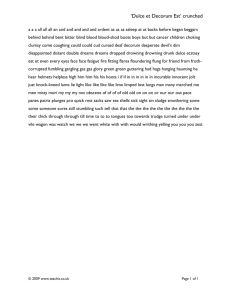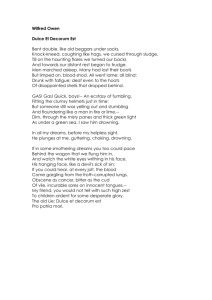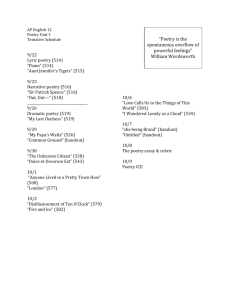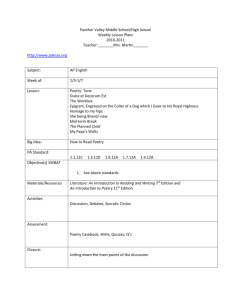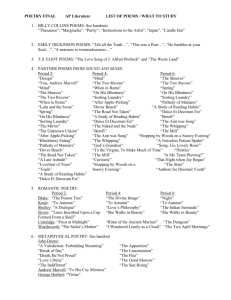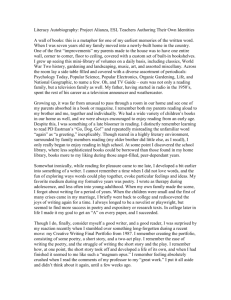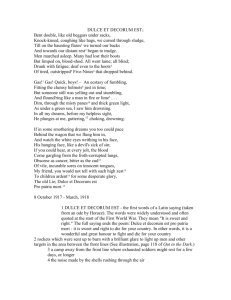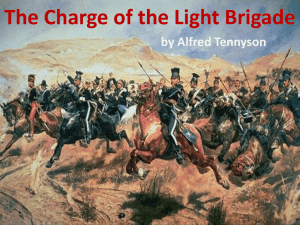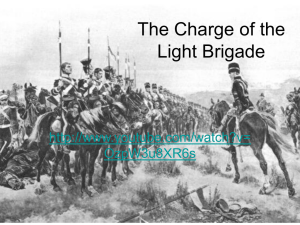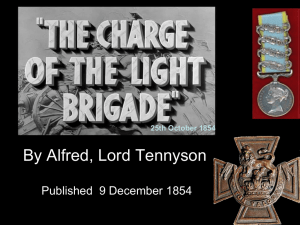rhYThm and PaCe in PoeTrY - Poetry Class | Poetry Society
advertisement
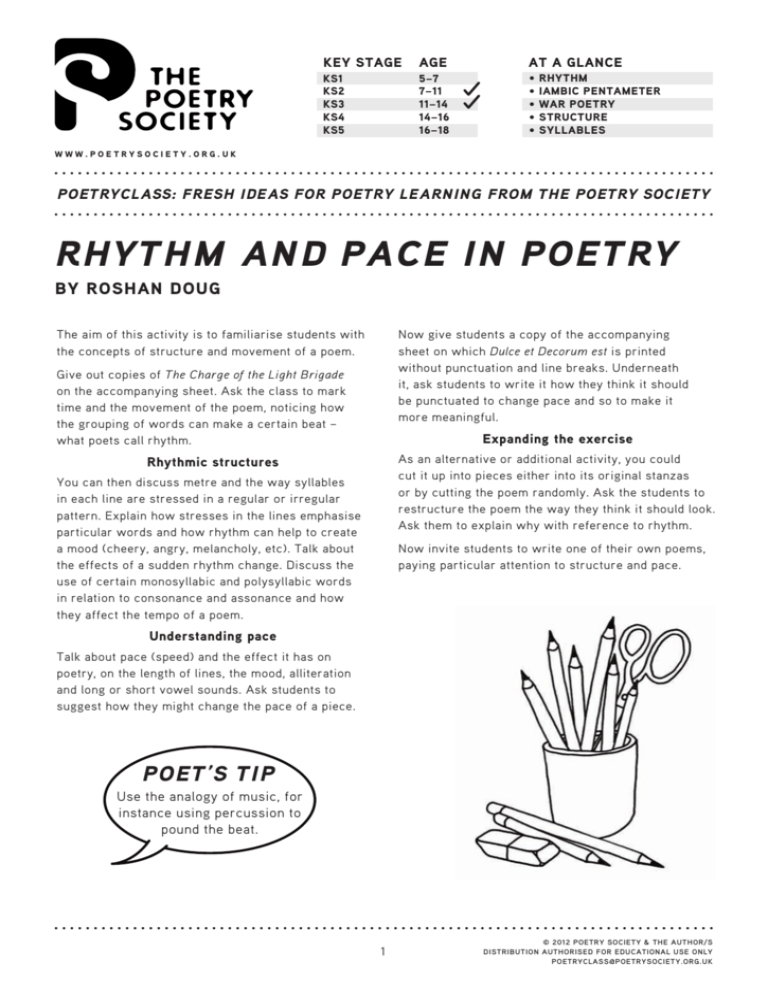
key stAge Age At A glAnce KS1 KS2 KS3 KS4 KS5 5–7 7–11 11–14 14–16 16–18 • • • • • rHytHM iAMBic pentAMeter wAr poetry structure syllABles www.poetrysociety.org.uk PoeTrYCLass: fresh ideas for PoeTrY Learning from The PoeTrY soCieTY rhYThm and PaCe in PoeTrY By rosHAn doug The aim of this activity is to familiarise students with the concepts of structure and movement of a poem. Now give students a copy of the accompanying sheet on which Dulce et Decorum est is printed without punctuation and line breaks. Underneath it, ask students to write it how they think it should be punctuated to change pace and so to make it more meaningful. Give out copies of The Charge of the Light Brigade on the accompanying sheet. Ask the class to mark time and the movement of the poem, noticing how the grouping of words can make a certain beat – what poets call rhythm. expanding the exercise As an alternative or additional activity, you could cut it up into pieces either into its original stanzas or by cutting the poem randomly. Ask the students to restructure the poem the way they think it should look. Ask them to explain why with reference to rhythm. rhythmic structures You can then discuss metre and the way syllables in each line are stressed in a regular or irregular pattern. Explain how stresses in the lines emphasise particular words and how rhythm can help to create a mood (cheery, angry, melancholy, etc). Talk about the effects of a sudden rhythm change. Discuss the use of certain monosyllabic and polysyllabic words in relation to consonance and assonance and how they affect the tempo of a poem. Now invite students to write one of their own poems, paying particular attention to structure and pace. understanding pace Talk about pace (speed) and the effect it has on poetry, on the length of lines, the mood, alliteration and long or short vowel sounds. Ask students to suggest how they might change the pace of a piece. PoeT’s TiP Use the analogy of music, for instance using percussion to pound the beat. 1 © 2012 POETRY SOCIETY & THE AUTHOR/S DISTRIBUTION AUTHORISED FOR EDUCATIONAL USE ONLY POETRYCLASS@POETRYSOCIETY.ORG.UK www.poetrysociety.org.uk The Charge of The LighT Brigade Half a league, half a league, Half a league onward, All in the valley of Death Rode the six hundred. ‘Forward, the Light Brigade! Charge for the guns’ he said: Into the valley of Death Rode the six hundred. ‘Forward, the Light Brigade!’ Was there a man dismay’d? Not tho’ the soldiers knew Some one had blunder’d: Theirs not to make reply, Theirs not to reason why, Theirs but to do and die: Into the valley of Death Rode the six hundred. Cannon to the right of them, Cannon to the left of them, Cannon in front of them Volley’d and thunder’d; Storm’d at with shot and shell, Boldly they rode and well, Into the jaws of Death, Into the mouth of Hell Rode the six hundred. 2 © 2012 POETRY SOCIETY & THE AUTHOR/S DISTRIBUTION AUTHORISED FOR EDUCATIONAL USE ONLY POETRYCLASS@POETRYSOCIETY.ORG.UK www.poetrysociety.org.uk Flash’d all their sabres bare, Flash’d as they turned in air Sabring the gunners there, Charging an army while All the world wonder’d: Plunged in the battery-smoke Right thro’ the line they broke; Cossack and Russian Reel’d from the sabre-stroke Shatter’d and sunder’d. Then they rode back, but not Not the six hundred. Cannon to right of them, Cannon to left of them, Cannon behind them Volley’d and thunder’d; Storm’d at with shot and shell, While horse and hero fell, They that had fought so well Came thro’ the jaws of Death, Back from the mouth of Hell, All that was left of them, Left of six hundred. When can their glory fade? O the wild charge they made! All the world wonder’d. Honour the charge they made! Honour the Light Brigade, Noble six hundred! Alfred, lord tennyson 3 © 2012 POETRY SOCIETY & THE AUTHOR/S DISTRIBUTION AUTHORISED FOR EDUCATIONAL USE ONLY POETRYCLASS@POETRYSOCIETY.ORG.UK www.poetrysociety.org.uk duLCe eT deCorum esT Bent double like old beggars under sacks knock-kneed coughing like hags we cursed through sludge till on the haunting flares we turned our backs and towards our distant rest began to trudge men marched asleep many had lost their boots but limped on blood-shod all went lame all blind drunk with fatigue deaf even to the hoots of disappointed shells that dropped behind GAS Gas quick boys an ecstasy of fumbling fitting the clumsy helmets just in time but someone still was yelling out and stumbling and floundering like a man in fire or lime dim through the misty panes and thick green light as under a green sea I saw him drowning In all my dreams before my helpless sight he plunges at me guttering choking drowning if in some smothering dreams you too could pace behind the wagon that we flung him in and watch the white eyes writhing in his face his hanging face like a devil’s sick of sin if you could hear at every jolt the blood come gargling from the froth-corrupted lungs obscene as cancer bitter as the cud of vile incurable sores on innocent tongues my friend you would not tell with such high zest to children ardent for some desperate glory The old Lie Dulce et decorum est Pro patria mori wilfred owen 4 © 2012 POETRY SOCIETY & THE AUTHOR/S DISTRIBUTION AUTHORISED FOR EDUCATIONAL USE ONLY POETRYCLASS@POETRYSOCIETY.ORG.UK www.poetrysociety.org.uk duLCe eT deCorum esT Bent double, like old beggars under sacks, Knock-kneed, coughing like hags, we cursed through sludge, Till on the haunting flares we turned our backs And towards our distant rest began to trudge. Men marched asleep. Many had lost their boots But limped on, blood-shod. All went lame; all blind; Drunk with fatigue; deaf even to the hoots Of disappointed shells that dropped behind. GAS! Gas! Quick, boys! – An ecstasy of fumbling, Fitting the clumsy helmets just in time; But someone still was yelling out and stumbling And floundering like a man in fire or lime¼ Dim, through the misty panes and thick green light As under a green sea, I saw him drowning. In all my dreams, before my helpless sight, He plunges at me, guttering, choking, drowning. If in some smothering dreams you too could pace Behind the wagon that we flung him in, And watch the white eyes writhing in his face, His hanging face, like a devil’s sick of sin; If you could hear, at every jolt, the blood Come gargling from the froth-corrupted lungs, Obscene as cancer, bitter as the cud Of vile, incurable sores on innocent tongues, – My friend, you would not tell with such high zest To children ardent for some desperate glory, The old Lie: Dulce et decorum est Pro patria mori. WiLfred oWen 5 © 2012 POETRY SOCIETY & THE AUTHOR/S DISTRIBUTION AUTHORISED FOR EDUCATIONAL USE ONLY POETRYCLASS@POETRYSOCIETY.ORG.UK
